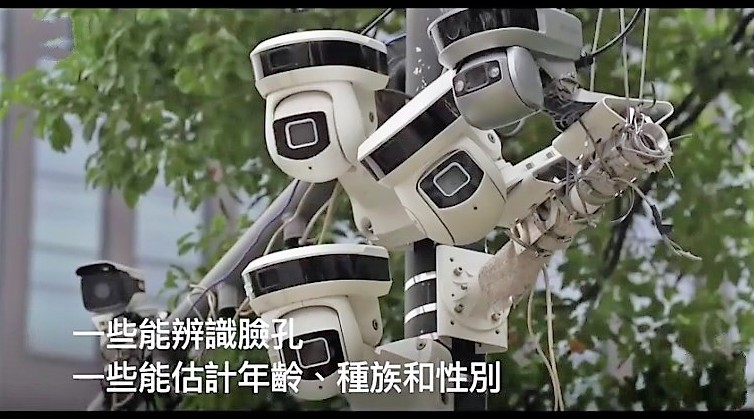The CCP’s surveillance of the entire population has reached the point of leaving no gaps. It monitors people’s words and actions through cameras, internet censorship, and other means. (Video screenshot)
[People News] China’s economy is depressed, people’s livelihoods are miserable, and venting inner suffering and complaints online has become the norm. As public discontent with life’s hardships, society, and the government grows ever stronger, an anti-CCP current of thought has gradually formed among the people. This has made the CCP’s sense of crisis increasingly intense, to the point of “fearing the people’s voices more than floodwaters.” Recently, the CCP’s Cyberspace Administration of China (CAC) struck hard, announcing a crackdown on online social media to suppress content containing “malicious incitement of division” as well as the promotion of “pessimistic and negative outlooks on life.” This move by the CCP is essentially forcing the entire population to “swallow their broken teeth along with their blood” — no matter how bitter, they must endure it silently.
The CCP’s “Cyberspace Administration of China” (CAC) announced on the 22nd that it will conduct a two-month special rectification campaign targeting social media, declaring its aim to suppress content containing “malicious incitement of division” as well as the promotion of “pessimistic and negative outlooks on life.”
In its statement, the CAC listed specific online phenomena targeted by the campaign, including “forcibly linking social hotspots to identity, region, or gender, and then using them for stigmatising hype.” The authorities also stated that spreading “rumours” about the economy, finance, social welfare, and public policy would not be permitted. They vowed to crack down on content that “maliciously interprets social phenomena, exaggerates negative cases in a one-sided manner, and uses them to promote pessimistic and negative outlooks on life.”
According to AFP analysis, this move may be seen as directly targeting the “lying flat” or “let it rot” culture widely circulating among young people in China. These terms are used to describe an attitude of rejecting high-pressure work culture in favour of seeking a more relaxed and easy-going lifestyle.
During the three years of the pandemic, a phrase spread from Shanghai residents that went viral online and resonated strongly with the public: “We are the last generation.” That phrase may soon be censored. Likewise, the White Paper Movement and the White Hair Movement — where crowds shouted in unison “Down with the Communist Party” and “Down with Xi Jinping” — will also likely become targets of the authorities’ crackdown and be banned from appearing on China’s internet.
More recently, one of the hottest topics online in China has been the case of actor Yu Menglong’s unnatural death. Countless netizens have called on the authorities to investigate the killer. Many netizens have engaged in doxxing and exposing information on possible suspects, even implicating senior CCP officials and the family of the CCP’s top leader. This has aroused great concern across society and within overseas Chinese communities. The CCP authorities’ cover-up of the truth and inaction have ignited strong dissatisfaction among grassroots people. Netizens have shifted from condemning the darkness of the entertainment industry to angrily denouncing the regime for disregarding people’s lives while protecting CCP officials and their families. Public sentiment has clearly developed beyond the authorities’ control.
In addition, in recent years, videos have emerged on the Chinese internet showing poor people’s daily lives — what they eat, what they wear, how bad their living conditions are — while grassroots governments at the township and village levels ignore them completely. These videos reveal to the outside world that there are still so many impoverished people in China in need of attention, especially elderly people in rural areas who cannot survive on pensions of barely over 100 yuan per month. Meanwhile, CCP officials — including the vast number of retired cadres — receive tens of thousands or even more than 100,000 yuan per month in pensions, along with astronomical public medical expenses. This stark contrast, combined with the CCP’s massive foreign aid handouts, has further ignited public anger, spreading discontent with the CCP among the lower levels of society.
Large numbers of videos and posts have also appeared online, describing how people’s property values have plummeted, causing devastating financial losses. Many have gone bankrupt as a result, even giving away houses for free.
There is also no shortage of people crying online about being unable to find jobs and unable to survive. The CCP is now targeting these struggling people at the bottom, forbidding them from venting their grievances online. Otherwise, “the law will deal with them” in one way or another.
In reality, more than 600 million people in China earn less than 1,000 yuan per month, making it difficult even to afford rent in mid-sized cities. At the same time, unemployment has worsened in recent years, and the living standards of the vast majority of citizens have continued to decline. Many people can no longer even afford a “lying flat” lifestyle. Their hearts are filled with depression, confusion, and pressure they cannot release. If they complain a little on the internet, they immediately become targets of the CCP’s iron fist. This is undoubtedly pouring fuel on the fire, causing the people’s resentment to burn even more fiercely. As a result, this political internet crackdown by the CCP is essentially a declaration of war against the entire Chinese population, testing how much longer the people can endure — and accelerating the CCP’s downfall.
(First published by People News) △









News magazine bootstrap themes!
I like this themes, fast loading and look profesional
Thank you Carlos!
You're welcome!
Please support me with give positive rating!
Yes Sure!